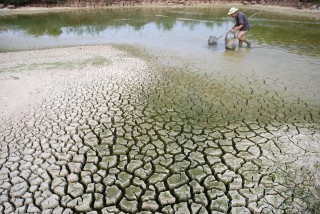The United Kingdom’s MET office, recently released a report regarding, El Nino, a natural phenomenon which occurs every two to seven years. According to the report, the next two years will be the hottest in the world, as El Nino will heat up the world considerably. The MET Office’s Professor Adam Scaife said the Earth’s climate system is at a “turning point”, with several global changes occurring at once. According to experts, global warming may likely become a problem once more for the world as soon as El Nino occurs. They call El Nino, an icing on the cake as other factors like underlying warming caused by man-made climate change and changes in ocean temperatures, may be playing a part in global warming tendencies.
Africa has suffered many setbacks due to global warming, mostly due to unimplemented policies. According to Wendy Okolo et al, in a Qualitative Policy Study on Climate Change, some of the major factors, which make it difficult to implement policies in Africa are overlapping mandates, limited policy literacy at local levels, poor coordination and little attention to local context. Guinea Bissau, Sierra Leone, South Sudan and Ethiopia are a few of the countries that have recorded a massive effect of global warming, ranging from population displacement, droughts, famine, heat waves and rise of sea levels. Here is a look at how global warming is being handled in relation to unimplemented policies in the largest African countries with the biggest economies – Nigeria, South Africa, Egypt and Kenya.
Nigeria
One of the major climate challenges in Nigeria is gas flaring. Gas flaring presents scenarios of impoverishment as well as environmental, economic and health (premature deaths, respiratory illnesses, asthma and cancer) challenges. Although, the act is illegal in Nigerian Law, it is still practiced by oil companies. While the people of the Niger Delta are constant victims of gas flaring, their entire ecosystem suffers from it as well. In April 2015, Nigeria shunned the World Bank-backed zero gas flaring summit, while few other African countries were in attendance- this speaks volumes of the country’s stance on gas flaring. There is also a failure in the implementation of policies centred on the preservation of nature in the country. In “National Energy Policy and Gas Flaring In Nigeria”, Nii Nelson outlines cheap fines for gas flaring offences as one of the reasons why implementing the law against the act is difficult.
Kenya
In March 2013, Kenya launched its National Climate Change Action Plan. The plan was developed to address the options for a low-carbon climate resilient development pathway as Kenya adapts to climate impacts and mitigates growing emissions. The project focused on exploration of renewable sources of energy – hydro, solar, geothermal, wind and bio-energy power. As of 2015, the inadequacy of climate information is a challenge to the implementation of climate change policies in the country. Waves Partnership notes the risks facing afforestation in the country which adversely affect Kenya’s economic sectors: agriculture, forestry and fishing, electricity and water, accommodation, public administration and defense.
South Africa
In 2014, the South African Cabinet approved a study to investigate the potential for greenhouse gas emission reductions in various South African industry sectors, including energy, transport and waste management. The journey so far indicates that policies to reduce emissions through increased deployment of renewable energy have been recommended. However, South Africa’s economy relies heavily on mining and heavy industry. Energy consumption in the industrial and buildings sectors relies largely on electricity as an energy source, which is produced with high carbon intensity using domestic coal. South Africa’s government is committed to establishing policies that will reduce the effect of greenhouse gases as emitted by human activities which could influence climate change in a major way. Regardless of this, Gina Ziervogel recommends a tightening in knowledge gaps in impact assessment and quantification of socio-economic costs. She also a better cooperation between public and private organisations to meet the country’s adaptation needs.
Egypt
In Egypt, the Nile Delta is at risk of sea level rise, as a result of global warming, the Mediterranean Sea is rising – by more than one millimetre per year – and the Nile Delta faces a severe loss of sediment used to build-up the basin. As a result, Egypt could see 30 percent of the Delta become submerged in the next 15 years. In April 3, 2015, the executive director of the African Community Advancement Initiative, Daniel Donovan, says one-half meter rise in sea level would force 1.5 million people to evacuate and almost 200,000 jobs would be lost. This would also have disastrous effects on the tourism industry, which accounts for 12.6 percent of employment.
Noha Saad writes about the unrealistic view many Egyptians have of global warming, she warns that they never truly grasp the consequences of man-made emissions, while advocating that the concept of global warming is lost on the people. Egypt’s Second National Communication report on Climate Change for the United Nations Framework Convention on Climate Change (UNFCCC), published in 2010, observes that the country’s vulnerability stems from its unique combination of geography, population distribution, land-use and economic activity. This is due to the fact that Egypt’s lifelines are constrained to five percent of its land area, the Nile Valley and its Delta. Egypt plans to produce 20 per cent of its energy from renewable sources and has already received 300 million dollars from the World Bank’s Clean Technology Fund. They are planning to implement a feed-in tariff to support the further development and proliferation of renewable energy technologies.
As policies in these major African countries are still unimplemented, the effects from El Nino will have to prompt the education of all citizens across countries on the subject of global warming, so they can better prepare for and protect their environment. The government also needs to pay more attention to the actual execution of climate change policies.








